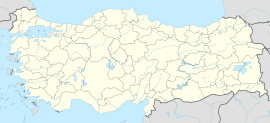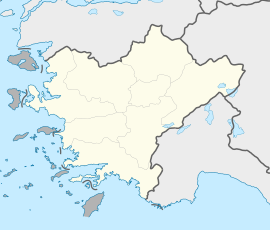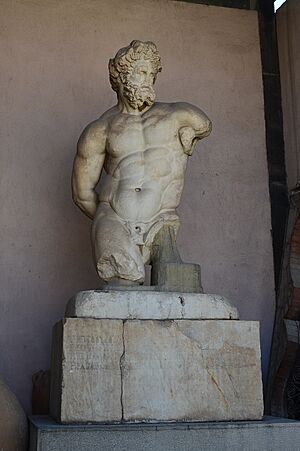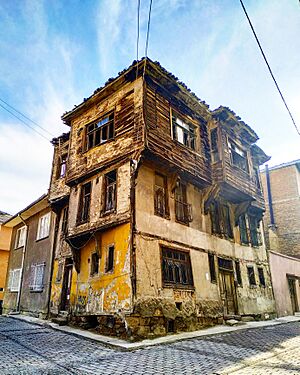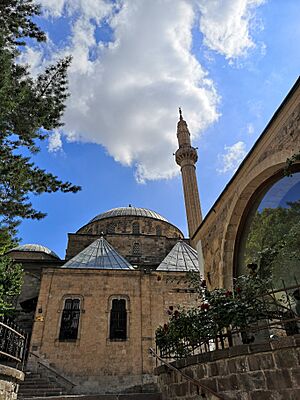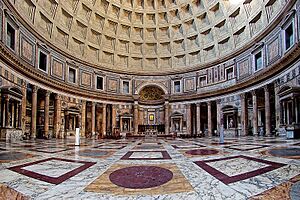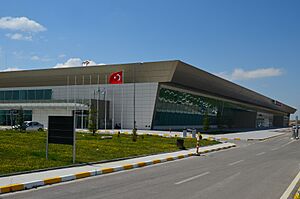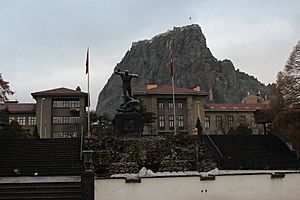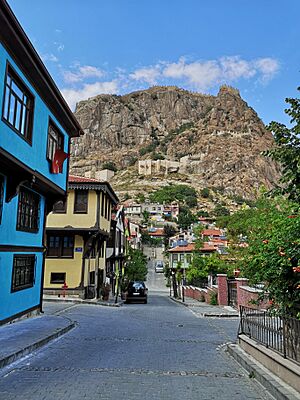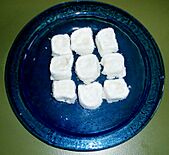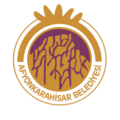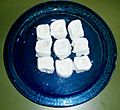Afyonkarahisar facts for kids
Quick facts for kids
Afyonkarahisar
|
||
|---|---|---|
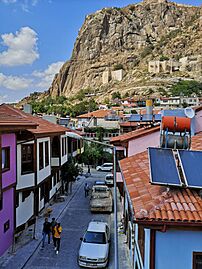
View of Afyonkarahisar Castle
|
||
|
||
| Country | Turkey | |
| Province | Afyonkarahisar | |
| District | Afyonkarahisar | |
| Elevation | 1,021 m (3,350 ft) | |
| Population
(2021)
|
251,799 | |
| Time zone | TRT (UTC+3) | |
| Postal code |
03000
|
|
| Licence plate | 03 | |
Afyonkarahisar is a city in western Turkey. It is the main city of Afyonkarahisar Province and Afyonkarahisar District. About 251,799 people lived there in 2021. Afyonkarahisar is located in a mountainous area, far from the Aegean coast. It is about 250 kilometers (155 miles) southwest of Ankara, along the Akarçay River.
This city is famous for its hot springs and spas. It is also a key meeting point for trains, highways, and air travel in West Turkey. Afyonkarahisar is also known as the place where Turkey won its independence. The city is a leader in agriculture and is globally known for its marble. It is also a major producer of opium for medical uses. In ancient times, the city was called Akroinon. It is home to the historic Afyonkarahisar Castle.
Contents
- What's in a Name?
- A Journey Through Time: Afyonkarahisar's History
- Afyonkarahisar's Economy: What the City Makes
- Afyonkarahisar's Weather
- Getting Around: Transport in Afyonkarahisar
- Afyonkarahisar Today: What to See and Do
- Delicious Afyonkarahisar Cuisine
- Must-See Sights in Afyonkarahisar
- City Connections: Twin Towns
- Famous People from Afyonkarahisar
- Images for kids
- See also
What's in a Name?
The name Afyonkarahisar means opium black fortress in Turkish. It is often called just Afyon. Older names included Karahisar-i Sahip and Afium-Kara-hissar. The city was known as Afyon until the Turkish Parliament changed its name to Afyonkarahisar in 2004.
A Journey Through Time: Afyonkarahisar's History
The rock where Afyonkarahisar Castle stands has been a fortified place for a very long time.
Ancient Beginnings
The Hittites knew this place as Hapanuwa. Later, it was ruled by the Phrygians, Lydians, and Persians. Alexander the Great then conquered it. After Alexander's death, the city was called Akroinοn or Nikopolis in Ancient Greek. It was ruled by the Seleucids, then the kings of Pergamon, and later by Rome and Byzantium.
Medieval Times and Battles
Akroinοn became an important fortress for the Byzantine Empire. This was because of its strong natural defenses and location. It was first mentioned in Byzantine history when Arab invaders attacked it in 716 and 732. The Byzantine emperor Leo III renamed the city Nicopolis (meaning "city of victory"). He did this after his victory over Arab attackers in 740.
After 1071, the town became a border area between the Byzantine Empire and the invading Turks. The Turks took control of the city around 1210. They renamed it Kara Hissar, which means "black castle". This name came from the old fortress on a volcanic rock 201 meters (660 feet) above the town. Later, the Sâhib Ata and then the Germiyanids ruled the town.
The Ottoman Sultan Beyazid I conquered the castle in 1392. But it was lost after Timur Lenk invaded in 1402. The Ottomans took it back in 1428 or 1429.
Modern History and Independence
The area grew wealthy during the Ottoman Empire. Afyon became a rich city. From 1867 to 1922, it was part of the Ottoman Empire. In 1902, a large fire burned parts of the city for 32 hours.
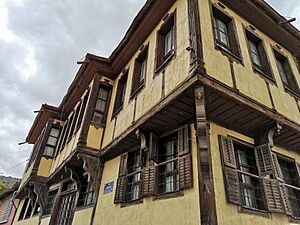
During the Greco-Turkish War (1919-1922), Greek forces occupied Afyon and its surrounding hills. However, Turkish forces took it back on August 27, 1922. This was a very important moment in the Turkish War of Independence. After 1923, Afyon became part of the Republic of Turkey.
Afyon was even shown on the back of the Turkish 50 lira banknote from 1927 to 1938.
Afyonkarahisar's Economy: What the City Makes
The economy of Afyonkarahisar relies on farming, industries, and health tourism. Farming is especially strong because many people live in the countryside. This helps agricultural activities grow a lot.
Famous Marble
Afyonkarahisar produces a lot of Turkey's processed marble. It ranks second in marble exports and fourth in travertine (another type of stone). Afyon has about 12.2% of all of Turkey's marble reserves.
Historically, marble from Afyon was called "Docimeaen marble." This was because it was mined in a place called Docimium. Afyon has unique types and colors of marble. These include "Afyon white," also known as "Synnadic white," and "Afyon Menekse," known as "Pavonazzetto."
Ancient Romans loved Docimian marble for its unique colors and fine quality. Roman emperors like Augustus, Trajan, and Hadrian used Docimian marble in many of their big building projects. These include the Pantheon and Trajan's Forum.
Healing Thermal Springs
Afyon's land has a lot of geothermal activity. This means there are many thermal springs with hot, mineral-rich water. There are five main springs, and their temperatures range from 40 to 100 °C (104 to 212 °F). These waters are believed to have strong healing properties for some illnesses. Because of this, many thermal facilities have been built over time.
Afyon has improved its thermal sector with more comfort and new ideas. It has combined traditional bath houses with 5-star resorts. The health benefits of the natural springs make these resorts more than just attractions. Hospitals and universities work with thermal resorts to use the full health potential of the springs. For example, Afyon Kocatepe University Physical Therapy and Rehabilitation Hospital was opened for this reason. Afyon now has the largest number of thermal resorts, many of which are 5-star hotels offering medical care.
Special Mineral Water
Kızılay was Turkey's first mineral water factory. It opened in Afyon in 1926, started by Atatürk. This happened after the mineral water from Gazligöl springs helped Atatürk's kidneys. Since then, "Kızılay Mineral Water" has become the biggest mineral water distributor in Turkey, the Middle East, and the Balkans.
Farming and Food
Afyon is a big farming area, and its land is great for raising animals.
- Livestock: Afyon raises many sheep and cattle. It is in the top 10 provinces in Turkey for the number of these animals.
- Meat Products: Because it has so much livestock, Afyon is also very good at producing meat and meat products. It is a leading province in red meat production. It also has famous sausage brands, like "Cumhuriyet Sausages."
- Eggs: Afyon is the top producer of eggs in Turkey. It has the most laying hens, with about 12.7 million. It produces a record 6 million eggs every day!
- Cherries: Sour cherries are grown in huge numbers in Afyon. They are so important that a sour cherry festival happens every year in the Cay district. Afyon is the largest producer of sour cherries in Turkey. The cherries grown here are excellent because of the perfect climate.
- Poppy: Growing poppy plants is a traditional farming practice in Afyon. The climate is ideal for this plant. Afyon is the largest producer of poppy in Turkey for legal, pharmaceutical uses. This production follows international laws.
- Potatoes and Sugar Beets: Afyon is well-known for growing potatoes. It produces about 8% of Turkey's potato needs. It is also in the top 5 for producing sugar beets, cucumbers, and barley.
Afyonkarahisar's Weather
Afyonkarahisar has a climate with warm, dry summers and cool winters. Most of the rain falls during spring and autumn.
- Highest recorded temperature: 39.8 °C (103.6 °F) on July 29, 2000
- Lowest recorded temperature: -27.0 °C (-16.6 °F) on January 28, 1954
| Climate data for Afyonkarahisar (1991–2020, extremes 1929–2023) | |||||||||||||
|---|---|---|---|---|---|---|---|---|---|---|---|---|---|
| Month | Jan | Feb | Mar | Apr | May | Jun | Jul | Aug | Sep | Oct | Nov | Dec | Year |
| Record high °C (°F) | 18.1 (64.6) |
21.8 (71.2) |
26.4 (79.5) |
30.2 (86.4) |
33.9 (93.0) |
35.8 (96.4) |
39.8 (103.6) |
39.6 (103.3) |
37.2 (99.0) |
31.3 (88.3) |
26.3 (79.3) |
21.0 (69.8) |
39.8 (103.6) |
| Mean daily maximum °C (°F) | 4.6 (40.3) |
7.1 (44.8) |
11.7 (53.1) |
16.6 (61.9) |
21.8 (71.2) |
26.2 (79.2) |
30.3 (86.5) |
30.2 (86.4) |
25.9 (78.6) |
19.7 (67.5) |
12.8 (55.0) |
6.8 (44.2) |
17.8 (64.0) |
| Daily mean °C (°F) | 0.4 (32.7) |
2.2 (36.0) |
6.0 (42.8) |
10.5 (50.9) |
15.3 (59.5) |
19.4 (66.9) |
22.8 (73.0) |
22.8 (73.0) |
18.5 (65.3) |
13.0 (55.4) |
6.9 (44.4) |
2.5 (36.5) |
11.7 (53.1) |
| Mean daily minimum °C (°F) | −3.0 (26.6) |
−1.8 (28.8) |
1.1 (34.0) |
4.9 (40.8) |
9.2 (48.6) |
12.7 (54.9) |
15.3 (59.5) |
15.4 (59.7) |
11.4 (52.5) |
7.2 (45.0) |
2.1 (35.8) |
−0.8 (30.6) |
6.1 (43.0) |
| Record low °C (°F) | −27.0 (−16.6) |
−25.3 (−13.5) |
−17.0 (1.4) |
−7.6 (18.3) |
−3.1 (26.4) |
1.0 (33.8) |
4.0 (39.2) |
2.4 (36.3) |
−3.2 (26.2) |
−7.9 (17.8) |
−20.5 (−4.9) |
−24.3 (−11.7) |
−27.0 (−16.6) |
| Average precipitation mm (inches) | 46.9 (1.85) |
38.4 (1.51) |
44.6 (1.76) |
47.0 (1.85) |
50.1 (1.97) |
41.5 (1.63) |
21.8 (0.86) |
18.0 (0.71) |
23.6 (0.93) |
40.3 (1.59) |
32.4 (1.28) |
46.8 (1.84) |
451.4 (17.77) |
| Average precipitation days | 12.37 | 12.4 | 12.37 | 11.6 | 11.8 | 8.07 | 3.6 | 4.27 | 4.63 | 7.97 | 7.57 | 12.87 | 109.5 |
| Average snowy days | 9.1 | 7.1 | 4.2 | 1.5 | 0 | 0 | 0 | 0 | 0 | 0 | 1.1 | 4.9 | 27.9 |
| Average relative humidity (%) | 77.7 | 72.1 | 65.1 | 61.2 | 59.9 | 56.5 | 49.6 | 50.8 | 53.6 | 63.9 | 70.3 | 77.7 | 63.2 |
| Mean monthly sunshine hours | 80.6 | 113.0 | 151.9 | 183.0 | 229.4 | 273.0 | 331.7 | 310.0 | 249.0 | 189.1 | 138.0 | 77.5 | 2,326.2 |
| Mean daily sunshine hours | 2.6 | 4.0 | 4.9 | 6.1 | 7.4 | 9.1 | 10.7 | 10.0 | 8.3 | 6.1 | 4.6 | 2.5 | 6.4 |
| Source 1: Turkish State Meteorological Service | |||||||||||||
| Source 2: NCEI, Meteomanz(snow days 2000-2005 and 2014-2017) | |||||||||||||
Getting Around: Transport in Afyonkarahisar
Afyon is an important railway hub. Train routes from İzmir, Konya, Ankara, and Istanbul all meet here. A new high-speed rail line between Ankara and Izmir is also planned to pass through Afyon.
Zafer Airport, located 60 kilometers (37 miles) from the city center, serves Afyonkarahisar. There are four flights per week to Istanbul and seasonal flights to other countries.
Afyonkarahisar Today: What to See and Do
Afyon is the center of a farming area. The city feels like a country town. It doesn't have many bars, cafes, or live music spots. However, it is home to Afyon Kocatepe University, a place for higher education.
Afyon is famous for its marble. In 2005, there were 355 marble quarries in the province. These quarries produce high-quality white stone. The city is also known for its sucuk (spicy sausages), kaymak (a type of cream or white Turkish delight), and handmade weavings. There is also a large cement factory.
Afyon is a natural crossroads. Roads from Ankara to İzmir and from Istanbul to Antalya meet here. This makes Afyon a popular stop for travelers. Many well-known roadside restaurants offer local food for breakfast. Some of these places are modern hotels and spas. The mineral waters of Afyon are famous for their healing powers. You can also find many roadside kiosks selling local Turkish delight.
Delicious Afyonkarahisar Cuisine
Afyonkarahisar has many tasty local dishes.
Main Dishes
- Sucuk - This is the famous local specialty. It's a spicy beef sausage, often eaten fried or grilled. Well-known brands include Cumhuriyet and Danet, which have special geographical recognition.
- Ağzaçık or bükme - A pastry similar to filo dough, filled with cheese or lentils.
- Keşkek - A stew made with boiled wheat, chickpeas, and meat.
Sweet Treats
- Local cream kaymak - This cream is eaten with honey, with a bread pudding called ekmek kadayıfı, or with pumpkin cooked in syrup. You can try it at the famous Ikbal restaurants.
- Turkish delight - A sweet, chewy candy.
- Helva - A sweet made from ground sesame seeds.
Must-See Sights in Afyonkarahisar
- Afyonkarahisar Castle - The fortress that gave the city its name. You need to climb eight hundred stairs to reach the top!
- Victory Museum (Zafer Müzesi) - A national military museum. It was used as headquarters by Mustafa Kemal Pasha (Atatürk) and his generals before a major battle in August 1922. It shows maps, uniforms, photos, and guns from the Greco-Turkish War.
- Afyonkarahisar Archaeological Museum - This museum holds thousands of ancient items from Hellenic, Phrygian, Hittite, Roman, and Ottoman times.
- Afyon Grand Mosque
- Altıgöz Bridge - Built by the Seljuqs in the 13th century, like the Ulu Camii.
- Afyon mansion (Afyon konağı) - Located on a hill with great views of the plain.
- The White Elephant - Afyon is twinned with Hamm, a town in Germany. Afyon now has a large statue of Hamm's symbolic white elephant.
With its rich old buildings, Afyonkarahisar is a member of the European Association of Historic Towns and Regions.
City Connections: Twin Towns
Afyonkarahisar has special connections with other cities around the world. These are called "twin towns" or "sister cities."
 Nyíregyháza, Hungary, since 1992
Nyíregyháza, Hungary, since 1992 Athens, Greece, since 1999
Athens, Greece, since 1999 Turkistan, Kazakhstan
Turkistan, Kazakhstan Hamm, Germany, since 2005
Hamm, Germany, since 2005 Peć, Kosovo, since 2008
Peć, Kosovo, since 2008 Yunfu, China, since 2007
Yunfu, China, since 2007 Latakia, Syria, since 2009
Latakia, Syria, since 2009
Famous People from Afyonkarahisar
Here are some notable people who were born in Afyonkarahisar:
- Mihran Mesrobian (1889–1975) - An architect and a decorated Ottoman soldier.
- İlker Başbuğ (born 1943) - A former Chief of the General Staff of Turkey.
- Ali Çetinkaya (1879–1949) - An Ottoman Army officer and Turkish politician.
- Veysel Eroğlu (born 1948) - A Turkish politician.
- Ahmed Karahisari (1468–1566) - A famous Ottoman calligrapher.
- Gülcan Mıngır (born 1989) - A middle-distance runner.
- Ahmet Necdet Sezer (born 1941) - A former President of Turkey.
- Sibel Özkan (born 1988) - An Olympic medalist in weightlifting.
- Nurgül Yeşilçay (born 1976) - A well-known actress.
- Gunay Uslu (born 1972) - A Dutch cultural historian and politician.
Images for kids
See also
 In Spanish: Afyonkarahisar para niños
In Spanish: Afyonkarahisar para niños
 | Percy Lavon Julian |
 | Katherine Johnson |
 | George Washington Carver |
 | Annie Easley |



